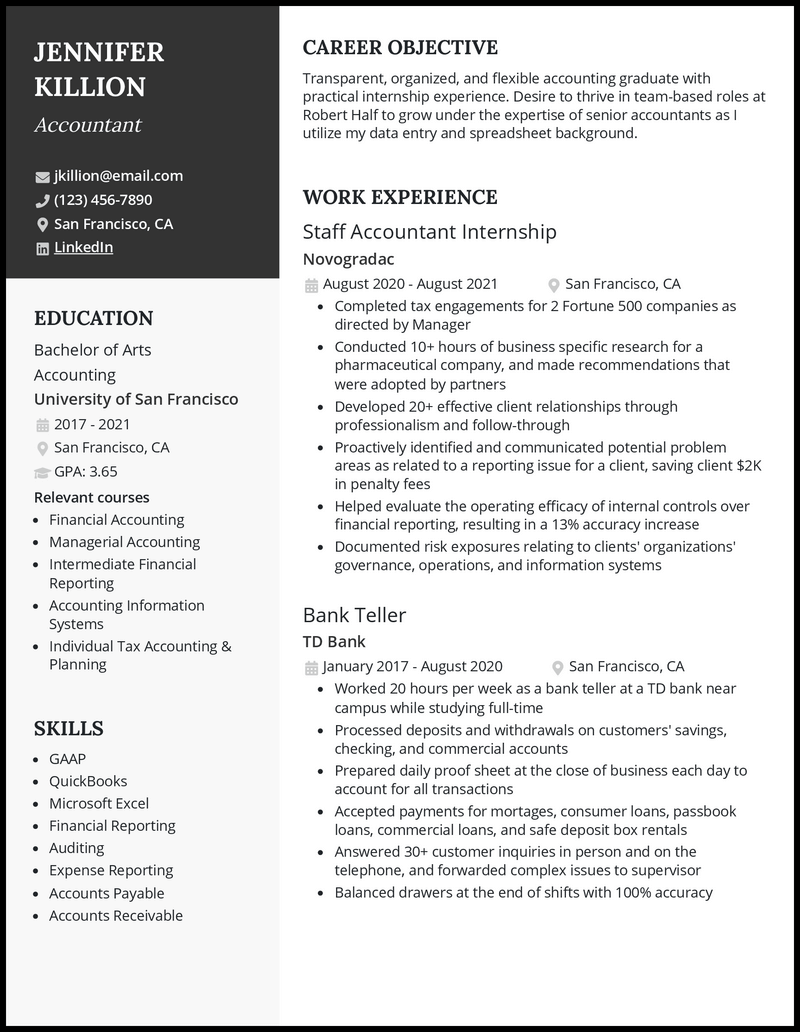

There’s plenty of room in our elegant resume template to add your professional experience while impressing recruiters with a sleek design.
Like this template? Customize this resume and make it your own with the help of our Al-powered suggestions, accent colors, and modern fonts.
As an up-and-coming accountant, you’re skilled at crunching numbers. As you prepare to take on responsibility for the financial backbone of a company, you know it’s more than just that adding up receipts.
Employers are looking for an accountant with hard skills like savvy financial reporting and soft skills like cross-team collaboration. But how can you showcase that experience when you’re, well, not experienced in the role?
Worry not! We’ve helped thousands of entry-level accountants score interviews and land their first job with our resume and cover letter writing tips. First, here are five entry-level accounting resume examples you can use to jumpstart your career.
 Entry level accountant resume example with bank teller experience" width="800" height="1032" />
Entry level accountant resume example with bank teller experience" width="800" height="1032" />
 Entry level accountant 2 resume example with retail experience" width="800" height="1032" />
Entry level accountant 2 resume example with retail experience" width="800" height="1032" />
 Entry level accountant 3 resume example with accounting project experience" width="800" height="1032" />
Entry level accountant 3 resume example with accounting project experience" width="800" height="1032" />
 Entry level accountant 4 resume example with teaching experience" width="800" height="1032" />
Entry level accountant 4 resume example with teaching experience" width="800" height="1032" />
 Entry level accountant 5 resume example with server and barista experience" width="800" height="1032" />
Entry level accountant 5 resume example with server and barista experience" width="800" height="1032" />

What matters the most at the end of the day, simply put, are your skills and work experience. If those fall short, the chances of you landing an interview for that accountant position drop significantly.
Basically, the skills you show provide a quick, overarching summary of your technical prowess and demonstrate your abilities.
Early in your accounting career, you’ll want to focus on courses you’ve taken and skills you’ve learned and picked up (or via internships).
Another pro tip: if you see a skill mentioned in the accounting job description and you have it, make sure you include it, even if it’s not a requirement.
If there’s one word you should remember, it’s impact. When you talk about your early experience or projects in accounting (or in another field with translatable skills), hone in on your accomplishments.
Don’t just list your duties; explain what they achieved. Instead of “implemented centralized purchasing,” say “implemented centralizing purchasing to reduce costs by 12%.”
By quantifying your impact (using a measurable outcome, when possible), you can show the value of your expertise.
Let’s make it concrete with a few more examples (notice that some of these examples are accountant-related while others are relevant experience with transferable skills in other industries):
Since this is an entry-level accounting position, perhaps. If you do, it’s important to customize your resume objective to every job you apply to. Mention the company by name, speak to your best skills the company is also seeking, and clearly show what you can bring to the table like this example:
Transparent, organized, and flexible accounting graduate with practical internship experience. Desire to thrive in team-based roles at Robert Half to grow under the expertise of senior accountants as I use my data entry and spreadsheet background.
Should I customize my accountant resume for each role?Absolutely! Don’t worry; that doesn’t mean entirely rewriting your resume. Instead, carefully read each job ad and ensure the skills and work experience they want have been woven throughout your resume. (This same idea applies when it comes time to create a cover letter, too.)
How specific should my skills section be?Your skills section should be specific enough for a recruiter to get a good summary of your mastery. Instead of just saying you’re skilled in financial accounting software, mention the software you’ve worked with, like Xero or FreshBooks, especially if the job listing also mentions that specific skill(s).